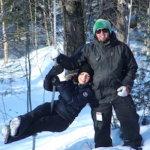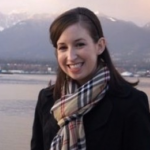Yoga for AYAs with Advanced Cancer
February 18, 2014
By: Hillary Woodside
I was in the middle of my undergraduate degree in Kinesiology when my mother was diagnosed with advanced cancer. Surrounded by professors who were fully committed to living and sharing their passion for staying active throughout the lifespan, I wanted to share this same outlook with my mum during her cancer journey. As she was a very active and on-the-move person, I found it difficult to connect the recommended rest and sleep to a fulfilling quality of life. In my mind, rest and sleep meant deconditioning and muscle atrophy. How was my mum going to maintain any functional fitness to carry out some of the light activities that she enjoyed doing, if her muscles and lungs were deconditioned?
I began to question why younger people with advanced cancer were not being encouraged to participate in some form of physical activity. My strong desire to uncover ways to improve the quality of life for advanced cancer patients through physical activity led me to undertake a Master of Science in cancer and physical activity research at Dalhousie University. The more I was exposed to the advanced cancer and physical activity literature, I was able to discover that, yes: physical activity is able to reduce cancer and treatment side effects that affect both your physical and mental wellbeing! Common symptoms that my mum had complained about, like fatigue, nausea, pain, and lack of mental awareness (e.g., chemo-brain), could potentially be mitigated with a light physical activity program! I thought to myself, “Finally! Even if I was not able to help my mum with this alternative thinking, maybe I can help improve the quality of life of someone else living with advanced cancer.”
With the help of my supervisor and many other mentors, we have developed a light 7-week home/hospice-based yoga program available for the AYA advanced cancer population. We are looking to examine the achievability, safety, and ability of a yoga program to reduce cancer-related side effects.
I am now in the recruitment stage of my research and am looking for AYA advanced cancer patients who are willing to try something a little more “alternative.” Although a yoga program for AYAs with advanced cancer is considered a new area of study, available literature in the adult advanced cancer population suggests that yoga is a safe and manageable form of physical activity. Also, this might be the perfect opportunity to try something new, instill a sense of normalcy and increase your energy.
Eligible participants must be: (a) English speaking (Questionnaires and DVD are in English); (b) diagnosed with a non-curative cancer and assigned to non-curative/palliative care; (c) between 15-39 years of age; and (d) have physician/oncologist consent to participate. Also, I have all the material to send to you to keep: yoga DVD, mat, block, and strap.
If you would like more information, please feel free to contact me at hillarywoodside@dal.ca or by phone at (902) 494-2579. Alternately, you can find more information about my study at ClinicalTrials.gov (ID#: NCT01901237) and on my Facebook page, under Yoga for AYA Cancer.




